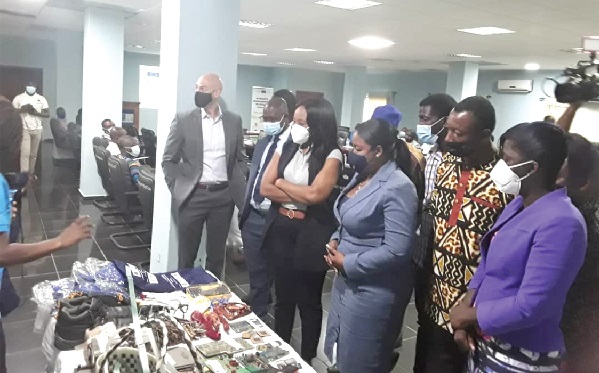Professor Rosemond Boohene (right), Ms Nana Afua Ababio (3rd right), Ms Viva Bruce (4th right) and other participants appreciating some recycled products of e-waste The formalisation of activities in the e-waste industry has created direct jobs for an estimated 20,000 to 35,000 people, with 120,000 depending indirectly on the industry.
According to the observation of implementers of the European Union-funded Electrical and Electronic Waste Management in Ghana (E-MAGIN) project, the beneficiaries included scrap dealers, general e-waste scrap dealers, technicians, electronic services technicians, collectors and recyclers.
This came to light at a two-day workshop in Accra last Monday for operators in the e-waste sector on access to finance for sound e-waste management.
The workshop, which was to assess the progress and discuss access to finance, brought together selected micro small, and medium-sized enterprises (MSMEs) in the e-waste sector across the country.
Participants in the workshop included the Scrap Dealers Association, General E-Waste Scrap Dealers Association, National Air-conditioning Refrigeration Workshop Owners Association (NARWOA), and Ghana Electronic Services Technicians Association (GESTA), among other collectors and recyclers.
Some financial service providers and the administrator of the Electrical and Electronic Waste Management Fund shared with the participants financial facilities that could be accessed by operators in the e-waste industry.
The workshop was also used as a platform for connecting MSMEs under the e-waste sector at the national level to financiers and also discuss the economics of establishing collection centres or take back systems.
Project
The E-MAGIN Project Coordinator, Professor Rosemond Boohene, said in the past three years, the E-MAGIN project had been backing the effective implementation of the Hazardous and Electronic Waste Control Management Act, 2016 (Act 917) by supporting the formalisation of informal stakeholders.
Also, she said the project was aimed at supporting the establishment of a nationwide collection mechanism, conducting training and capacity-building programmes, and providing decision support to policymakers through dialogue events, studies and policy briefs.
Prof. Boohene said following the introduction of the Act 917, the Legal Instrument LI 2250 and the technical guidelines on environmentally sound e-waste management, informal workers were required to formalise their operations by registering with state authorities to enable them to move under the ambit of the law."A core objective of the E-MAGIN project was to support informal MSMEs to formalise by forming associations, registering with public authorities and acquiring tax identification numbers,” she said.The project, the coordinator explained, was to ensure sound collection, dismantling and recycling of discarded electronic, electrical and […]
